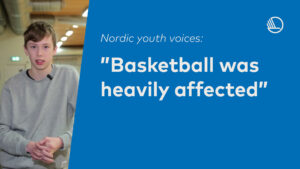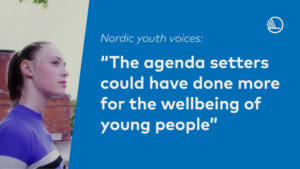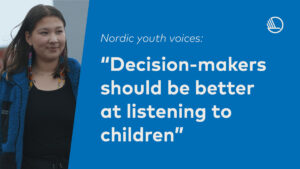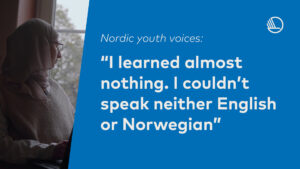Listen to Nordic youth, talk about their right to be heard in crises
Barn & unga
26 okt 2023
Listen to Ester, Majli, Nameh, Olle and eleven more youth from the Nordics. In our new publication they talk about their experiences during the Covid-19 pandemic and the lack of possibilities to be heard and have any influence on matters that concerned them.
Decision makers in the Nordic region were not prepared to protect children’s rights when the Covid-19 pandemic hit. The right to be heard and involved was often neglected or recognised too late. Having a say in your own life, impacts the wellbeing of children and youth, especially during times of crises.
In a collection of filmed interviews, youth from the Nordic region, as well as Lithuania, bravely share their experiences, shedding light on the ways the pandemic and the subsequent war in Ukraine impacted their lives and well-being.
Isolated and lonely
Ester felt isolated and lonely during the pandemic shutdowns. She believes that socialising with peers is crucial in the formative years of youth.
Gylta lost contact with most of her friends, as well as the players in her handball team who she had played with for nine years. Helmi talks about how her school supervisor organised a helpful course, where the pupils could talk about how to manage emotions such as loneliness and depression.
School work to catch up
Majli had to catch up with a lot of work when schools reopened after the lockdown periods. Eiður explains in his interview that he feels he missed out on getting to know his school peers. Tomas also missed seeing his friends and he would have preferred it if the schools had encouraged more physical exercise.
Sunniva got isolated from her friends in Norway since she started studies in Sweden when the pandemic started and borders closed.
Online education was too difficult
Nameh felt that she didn’t learn anything when the education moved online, as she lacked the necessary language skills.
Hannan was also new in Norway when the pandemic hit and found online education too difficult.
Mira was 23 years old and had just started her studies at university when the Covid-19 pandemic hit. Mira believes that some of the challenges the students encountered could have been addressed with better and clearer information.
Youth could have come up with better solutions
Listen to Julia explain how she felt like she was living the same day over and over again. Gabija in Lithuania found it hard to remain motivated in school during the pandemic.
 Max is convinced that youth would have come up with better solutions if they had been asked.
Max is convinced that youth would have come up with better solutions if they had been asked.
Olle found it challenging that his basket matches were cancelled and practice suspended, as his goal in life is to become a professional.
And Povilas talks about feeling emotionally drained and burdened by anxiety at the end of the pandemic.
Restrictions demanded youth to adapt to stressing new situations
The pandemic created an abrupt transition in education, compelling students to adapt to a new normal of distance learning and altered social interactions. For children and youth, this shift was not only educationally challenging but also socially demanding. Establishing new relationships with peers, teachers, and friends when isolated was a challenge to many.
Various restrictions were enforced across the Nordic region to curb the spread of the virus. The limitations on school and leisure activities had a significant impact on social relationships, mental well-being, and physical health of children and youth.
Research confirms what young people say
The insights shared by these young individuals resonate with emerging Nordic research, reinforcing the critical importance of involving youth in decision-making processes. The reports commissioned by the Nordic Welfare Centre shed light on the need for meaningful engagement of children and youth before crises. The research shows us lesson to learn to prepare better for future crises.
The stories in these 15 interviews serve as a poignant reminder of the need to prioritise the voices and perspectives of youth.



